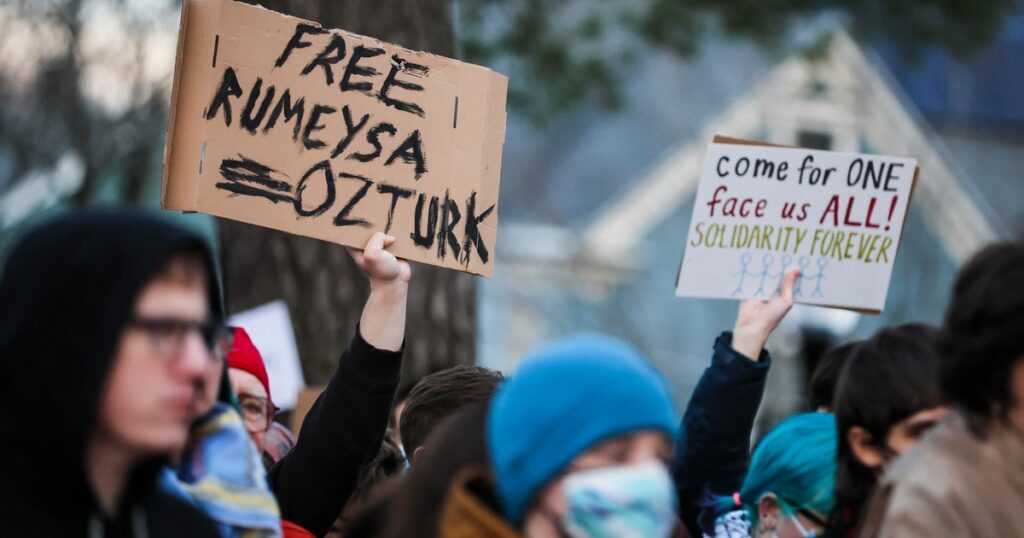A federal judge in Boston is holding a hearing Thursday regarding a Tufts University Ph.D. student taken into custody in Massachusetts and moved by Immigration and Customs Enforcement authorities to Louisiana last week.
The government claimed in a filing Tuesday that Rumeysa Ozturk, a Turkish doctoral student and Fulbright Scholar, had already been removed from Massachusetts before U.S. District Judge Denise Casper issued an order for her to stay in the state and that Casper no longer has jurisdiction to hear the case.
Attorneys for Ozturk had filed a habeas petition to block her removal from Massachusetts, as well as from the U.S., and a federal judge granted the petition. But the Justice Department’s filing Tuesday said she had already been transferred to an ICE detention center in Basile, Louisiana.
An acting Homeland Security Department official filed a sworn statement saying Ozturk was arrested on March 25 in Somerville, Massachusetts, where Tufts is located, and then moved to Lebanon, New Hampshire, then to St. Albans, Vermont, overnight. She was again moved at 4 a.m. on March 26 to Burlington, Vermont, before she was finally transferred to the ICE detention center in Basile. The judge’s order blocking her removal from Massachusetts was issued while Ozturk was in Vermont.
Ozturk, who’s in the U.S. on a student visa, was detained on her way to a Ramadan Iftar dinner. Surveillance footage showed six plainclothes ICE agents who appeared to be wearing masks stopping Ozturk on the street and taking her into custody.
She’s one of several students at American universities whose visas were revoked after they expressed support for Palestinians during the ongoing conflict in Gaza. Ozturk’s attorneys argue her detention violates her constitutional rights to free speech and due process, and have asked for her immediate return to Massachusetts and for her to be freed from government custody.
On Wednesday, Tufts president Sunil Kumar submitted a declaration defending Ozturk and supporting her motion regarding her release and return to Massachusetts. Kumar said the university “has no information to support the allegations that she was engaged in activities at Tufts that warrant her arrest and detention.”
He said that on March 26, the university received a notice stating that Ozturk was a “‘non-immigrant status violator'” and citing the Immigration and Naturalization Act, it said “the United States believed that her presence in the country would result in ‘potentially serious adverse foreign policy consequences for the United States.'”
Ozturk was one of four students at Tufts University who co-authored an op-ed in the Tufts Daily college paper in March 2024 urging the university to “acknowledge the Palestinian genocide” and “divest from companies with direct or indirect ties to Israel.” There is no mention of Hamas in the article. Kumar said the op-ed was consistent with the university’s free speech policies and there were “opinions that were shared just as strongly” on other sides of the issue.
“The University has no further information suggesting that she has acted in a manner that would constitute a violation of the University’s understanding of the Immigration and Naturalization Act,” Kumar wrote. He asked that Ozturk “receive the due process rights to which she is entitled,” so she can return to Tufts to finish her studies and her degree.
At the time of Ozturk’s detention, a spokesperson for the Department of Homeland Security said Ozturk “engaged in activities in support of Hamas,” but did not provide details about her alleged activities. The government’s filing Tuesday also contained no details about alleged ties to Hamas.
The Justice Department’s argument regarding jurisdiction — that the habeas petition arguments should be held where the person is being detained — has been used by the government in other court cases involving the Trump administration’s deportation efforts, including in the case of former Columbia student Mahmoud Khalil and in the cases of five Venezuelan men who sued to block their deportations under the Alien Enemies Act.
Secretary of State Marco Rubio has touted the administration’s cancellation of more than 300 student visas so far and said that student visas are meant to encourage studying and getting degrees, “not to become a social activist” and “tear up our university campuses.”
https://www.cbsnews.com/news/judge-tufts-phd-student-rumeysa-ozturk-detained-by-ice/


